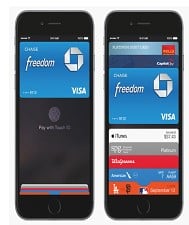Imagine yourself making a payment at a retail store, with several others queued up behind you. As soon as your card is swiped, the store’s Point of Sale (POS) system asks for additional verification details to authorize your payment. This could be a unique PIN number or any other security question, and you can’t remember the answer. What would you do now?
With the rising credit card frauds and other payment-related issues, the US Government is devising new strategies to ensure credit and debit card protection. Under the BySecure Initiative, it requires all credit card companies to undergo a mandatory transition from issuing magnetic strip credit cards to EMV-based chip cards, by 2015.
Improving the security features on your credit card is a good step; however, it has its own drawback. Additional payment authorization (as mentioned above) can be a hassle.
With its innovative technology, Apple Inc. provides a simple and effective payment solution, via the Apple Pay (mobile service) application.
How Does Apple Pay Work?
 Apple Pay allows users to collect and consolidate several credit card accounts on to the iOS application “Passbook”. These cards can be easily added via camera or the iTunes, after appropriate verification has been obtained by the issuing bank.
Apple Pay allows users to collect and consolidate several credit card accounts on to the iOS application “Passbook”. These cards can be easily added via camera or the iTunes, after appropriate verification has been obtained by the issuing bank.
Instead of swiping your magnetic strip or EMV-chipped credit card, you can now use your iphone for payment at a POS terminal. Apple Pay utilizes the Near Field Communication (NFC) technology when interfacing with the POS payment terminal. This does not require the use of internet connection for payment processing.
Making a payment with Apple Pay is easier. All you have to do is to hold your authenticated iphone near the POS terminal. To authenticate your transaction, fingerprint verification will suffice. This is done by touching the Touch ID Sensor screen on your phone. As your fingerprint is verified, the transaction is recorded on both the merchant’s POS and the client’s credit card.
What are the Benefits of Apple Pay?
Apple Pay is increasingly being recognized by all the major retail stores and chain markets across the United States. It is convenient for you to simply put forward their iphones in front of a POS system and authenticating the transaction via fingerprint to pay for their goods. Your iphone stores all credit card related information on a Secure Element in your Passbook. This keeps the information safe and less prone to fraudulent exposure and use.
From a merchant’s perspective, Apple Pay is essential. With nation-wide implementation of the EMV regulation in 2015, the onus of fraudulent credit card transactions will shift to the merchants. Apple Pay, in this scenario, will protect your business interests against potential risks because only EMV-recognized credit cards from your customer’s Passbook will be accepted.
As a credit card issuer, Apple Pay will protect your bank from facing the risk of fraudulent transactions.

